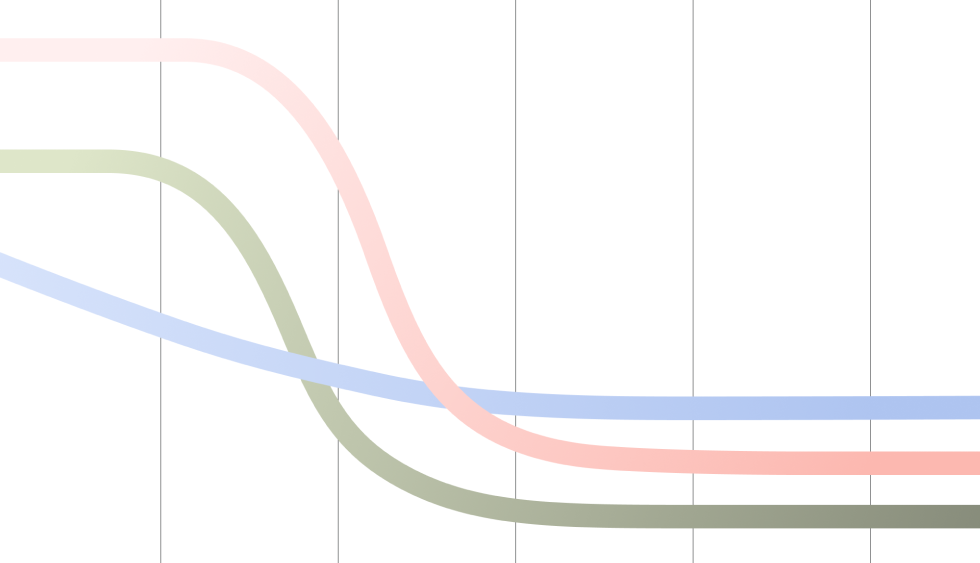Stepping into the menopause journey is like entering a new chapter in your life’s story, one that closes the book on menstrual cycles but also unfolds a series of changes across three distinct chapters—perimenopause, menopause, and postmenopause.
Each brings its own narrative of physical, emotional, and cognitive challenges and symptoms that are as unique as you are. This guide is here to help illuminate your path through these stages and provide the insights you need to navigate this natural transition with confidence and ease.
What are the 3 Stages of Menopause?
Perimenopause: The Beginning of Change
Perimenopause is the transitional period leading up to the early stages of menopause. It can start as early as your 40s (or even earlier for some) and is characterized by significant hormonal fluctuations.
Symptoms of this stage of menopause may include changes in menstrual cycle patterns, hot flashes, sleep disturbances, mood swings, and changes in sexual function.

Find relief from menopause symptoms
Connect with a nurse practitioner who specializes in menopause treatment. Get personalized care without the waiting room.
This part of the menopausal transition is marked by the body’s gradual reduction in estrogen production, and for many, it presents the most pronounced symptoms due to the erratic nature of hormonal changes.
Menopause: A Milestone Moment
Menopause might feel like an extended journey, but medically, it’s pinpointed to just one specific day—the day that marks twelve months after your final menstrual period.
This moment, typically unfolding between ages 50-52, signifies that the ovaries have stopped releasing eggs and as a result, stop producing estrogen.
While the cessation of menstruation can bring relief from certain symptoms, others like hot flashes, night sweats, and vaginal dryness may persist or emerge due to lower estrogen levels.
Postmenopause: Life After Menopause
Postmenopause (also sometimes called “late stage menopause”) follows menopause and lasts for the rest of your life. During this stage, hormone levels have stabilized at a lower level, and as the body gradually adapts, some symptoms may lessen in intensity.
However, challenges such as vaginal dryness and the consequences of decreased bone density can persist or intensify without proactive management. This stage also heightens the importance of focusing on long-term health, particularly in preventing osteoporosis and cardiovascular disease.
At What Stage are Symptoms the Worst?
The experience of menopause is highly individualized, with each of the phases of menopause bringing its own set of changes and challenges.
Some women might sail through menopause with minimal discomfort, while others may struggle with severe symptoms that significantly impact their quality of life.
Many find the perimenopausal period the most difficult due to the unpredictable nature of hormonal fluctuations and the wide array of symptoms they can cause.
However, the intensity and impact of these symptoms vary widely, influenced by factors such as lifestyle, overall health, genetics, and the presence of other medical conditions.
How Long is Each Menopause Stage?
Menopause itself is a single point in time, but the menopausal transition can span several years. Perimenopause typically lasts about four years, but the early stages of menopause can vary significantly in duration (from a few months to a decade).
Postmenopause, on the other hand, encompasses the remainder of an individual’s life, with varying experiences of symptom intensity and health risks.
How do I Know What Stage of Menopause I’m In?
To best identify the phases of the menopause transition, closely monitoring both your symptoms and changes in your menstrual cycle is essential for clarity. This method is particularly reliable, since blood tests for hormone levels can yield inconsistent results due to the natural fluctuations within your body.
Perimenopause (leading into the early stages of menopause) often brings a mix of menstrual irregularities and noticeable symptoms like hot flashes and mood swings. Once you’ve gone 12 consecutive months without a menstrual period, you’ve officially entered the postmenopause stage, marking a clear end to your menstrual cycles.
What Signals the End of Menopause?
Menopause itself does not end—it’s a milestone denoting the transition to the post-reproductive phase of life. The term “end of menopause” or “late stage menopause” often refers to the reduction or management of menopausal symptoms, which occurs during postmenopause.
This adjustment period varies, with some experiencing a decrease in symptoms a few years post-menopause, while others may continue to face challenges for a decade or more.
Navigating the stages of menopause (and their symptoms) can feel daunting, but understanding what to expect at each stage provides a roadmap for managing symptoms and maintaining health.
Remember, every individual’s journey through the phases of menopause is unique, and seeking advice from your healthcare practitioner can provide personalized guidance and support through this natural life transition.



